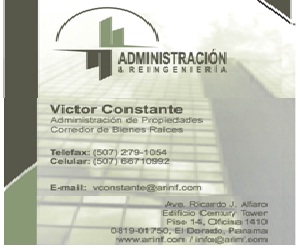

Advantages of Panama Private In ...

• Not subject to any form of taxation, tax or charge in the Republic of Panama (except for payment of an annual fee of $ 350.00 in the first year, $ 400.00 in subsequent years). Consequently, they are exempt from income tax, the estate tax, property tax, inheritance tax and sales tax.
• The Foundations Act requires all members of the Foundation Council, the Protectors, supervisory bodies or any person or institution by the reason of their duties to be aware that information concerning the activities, operations or transactions of a private foundation has to be maintained strictly confidential, even after its dissolution. Otherwise, this may result in imprisonment of up to six months and a fine of up to US $ 50,000, subject to the corresponding liabi ...[+]
Formation of Panama Private Int ...
If you are convinced that a Private Interest Foundation is for you, read the following to establish your own foundation. See application.
1. Personal Information: Complete the application with your personal contact details.
2. Select the name (s): In the application, you should indicate three name choices for each Foundation. The names of Panamanian Foundations can be in any language and must include the word "Foundation" in the name (in any language) in Spanish – fundacion, in English - foundation.
Once you have submitted your application, including the name (s) of its Foundation (s), we check to see if the names you selected are available in the Panama Public Registry. We can accomplish this within few hours.
3. Council (Directors): In the application, you must indicate whom you want to appoint as Council members (directors) of your Foundation (s). Council members may be individuals or entities. If Council members are individuals, the law requires 3 council members (President, Secretary and Treasurer). If Council members are entities, the law only requires one member.
If you are appointed as a Council member of the Foundation, then your name is publicly known as a Council member since names of Council members and identifications must be presented in the public registry when the foundation is established. Usually, the only documentation of public record is the Deed (or Act) of incorporation an ...[+]
Foundations in General
After the Principality of Liechtenstein lay the groundwork for the creation of family and mixed foundations in 1926, the Republic of Panama specifies this European model combining the features of Panamanian corporations, with the typical benefits of trusts to establish a most modern and convenient way what is now known as Private Interest Foundations.
The Private Interest Foundation is a type of entity that is something between a trust and a corporation, however, it is not any of them. The Foundation is a separate entity from any other entity known in the Anglo-Saxon law because it is not a legal personification of a person or group of persons (as it is a corporation), rather it is a legal entity that has no owners (shareholders, partners, participants or associates) and traditionally has a specific purpose for the benefit of a general group of individuals.
The Private Interest Foundation is a legal entity that was developed based on models of Private Foundations in three different jurisdictions, including the Principality of Liechtenstein, Switzerland and Luxembourg. The Panamanian Government carefully designed the Panama Private Interest Foundation with the intention of creating a modern, flexible and affordable estate planning vehicle for the people worldwide. The assets of the Foundations assume separate from the personal assets of the Founder, Protector, Council or Beneficiaries of the legal entity.
The Private Interes ...[+]
Purposes of Panama Private Inte ...
The Private Interest Foundation in Panama can be established for the benefit of a person or several persons, a family or for a specific social purpose.
For Asset Protection:
Basically, private interest foundations are used by individuals or families who wish to protect their assets against kidnappings, liens, claims or potential legal conflicts. Article 11 of the Law of Private Interest Foundation says "For all legal purposes, the assets of the foundation shall constitute a separate patrimony from the personal assets of the founder. Therefore they cannot be sequestered, embargoed or subject to any precautionary action or measure, except for obligations incurred, or for damages caused by virtue of fulfilling the purposes and objectives of the foundation, on behalf of the legitimate rights of its beneficiaries. In no case shall the assets respond for personal obligations of the founder or of the beneficiaries. "
Also important to note that Article 15 of the Law of Private Interest Foundation says" The creditors of the founder or of a third party shall have the right to dispute the contributions or transfer of assets in favour of a foundation, when the transfer constitutes an act of fraud to the creditors. The rights and actions of such creditors shall prescribe three (3) years from the date of the contribution or transfer of the assets to the foundation. "
For the Family Heritage:
Many individuals and families in Panama and in the world use Panamanian private interest foundations for structuring the assets and property of the family, for testamentary purposes. The Founder or Protector can choose the beneficiaries, and they will receive the goods at the time of death of the Founder or Protector, free of taxes or other charges or legal processes. Article 12 of the Law of Private Foundation says that "foundations shall be irrevocable ..." which allows the private foundation irrevocably continue operating for several family generations, according to the signs and instructions of the Founder or Protector that sets in the Founding Regulation.
As a Holding of Goods:
A person can use a Panamanian private interest foundation as a holding for their bank accounts, brokerage accounts, real estate, securities, certificates of shares of corporations, or any other property or assets you have. Private interest foundations are used to structure the assets of a person or a family. Th ...[+]
Structure of Panama Private Int ...
Panama Private Interest Foundation has a Founder, a Foundation Council, a Protector and Beneficiaries.
Founder: The Founder is the person or entity that establishes the Foundation in the Public Registry of Panama. In case, if you can not physically be in Panama for the formation of the Foundation, we can provide service of Nominee Founder of Panama Private Interest Foundation. If one wants to be the Founder of Panama Private Interest Foundation he must be physically in Panama to appear before the public notary to sign the Founding Act. It is important to say that the Founder of the Foundation, once it is registered in the Public Registry, can not be changed.
Foundation Council: The Council of the Foundation has the same function as the board of directors or officers in the corporation. In the Public Registry names, addresses, and identifications of the Foundation Council members are inscribed, indicating the position of each, as President, Secretary and Treasurer, who may be natural persons or legal entities. If the Foundation Council is composed by individuals, requires three (3) members of the Foundation Council. If the Foundation Council is composed by legal persons, it requires only one member of the Foundation Council. We offer the "Nominee Council" to complete the positions of the Foundation Council, and thus provide additional privacy and confidentiality to you. When we name the Nominee Council, we also provide you with resignation letters, undated, previously signed by each member of the nominee council, so that you can replace the council at any time.
Protector: The Protector is the person or entity that has ultimate control over the foundation and all the assets within it. The Protector is appointed by the Foundation Council when the foundation is established, however, once the Protector is empowered to exercise their power, the Protector can then remove the members of the Council at any time without anyone's consent . The Protector can be appointed privately by a private document, signed by the Foundation Council. Thus, the Protector can maintain this position free of public knowledge.
Usually, you can appoint yourself as a Protector of the foundation, through a Private Protectorate Document, so that you will maintain full control of the Foundation, privately and anonymously. Once a Protector is appointed, hr can always be changed by desire of Protector. However, a Pro ...[+]
Panama Account, Marca Registrada, 2014-2024


